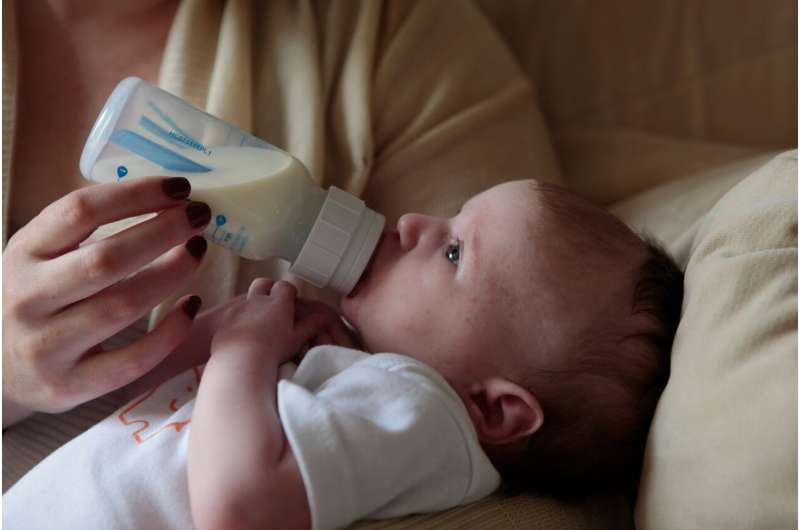This article has been reviewed according to Science X's editorial process and policies. Editors have highlighted the following attributes while ensuring the content's credibility:
fact-checked
trusted source
proofread
Shift work may have impact on out of sync breast milk hormone

The bond between a mother and infant may be stronger than first thought, a La Trobe University study has found. The research is published in the journal Breastfeeding Medicine.
Researchers have provided evidence that maternal circadian disruption, from mothers returning to shift work, may have an impact on the timing of their breast milk hormone.
"We observed a change in melatonin in participants' breast milk, with a significant decrease in mothers who worked multiple night shifts in a row compared to non-workdays, suggesting a shift in circadian timing of the breast milk hormones due to shift work schedules," lead researcher, Dr. Lauren Booker said.
Breast milk clearly exhibits a 24-hour pattern, with melatonin concentrations high during the evening and night (starting about 9pm and peaking between 2 and 3am) but are barely detectable in daytime milk. Infants are not born with an established circadian rhythm; it develops after three to four months. As a result, the different timed breast milk hormones may impact their sleep.
"If hormone signals in breast milk do indeed help calibrate infant circadian biology, infants that drink breast milk with hormones out of sync may experience difficulties with sleep, digestion and development, potentially having a dramatic effect on an infants' growth and long-term health," Dr. Booker said.
"Our previous research has shown that infants who are fed 'mistimed' expressed breast milk, that is milk expressed during the day and given at nighttime and vice versa, had significantly delayed sleep onset compared to infants who were directly breastfed and slept more during the day. This is the nutritional equivalent of switching the lights on right before bedtime, which could result in feelings associated with jetlag."
These serious health implications prompted the research team to further unpack mistimed melatonin in breast milk on infants' sleep, believed to be a first in Australia.
Katrina, a paramedic at Ambulance Victoria and casual nurse from Geelong, was among 11 mothers and shift workers across Victoria and Queensland who participated in the study, between September and December 2022.
Participants were required to collect saliva and breast milk samples at four times per day across five consecutive days. They were also asked to keep a daily log of when they collected each sample as well as when they went to sleep, woke up and worked.
"I'm passionate about breastfeeding and the benefits it provides for babies and children, but I had never considered that my shift work may be contributing to changed hormones in my breast milk," Katrina said.
"If there's potential for proven detriments to hormone levels in breast milk that may then affect your baby, I felt it was important to investigate."
At the time of the study, Katrina was a full-time paramedic and her daughter Maddie was 15 months old. Katrina's roster was two 10-hour day shifts, followed by two 14-hour night shifts and then four days off.
"As a paramedic—it's difficult to predict when you'll be out on a case or not, so I pumped in all sorts of strange places. I was pumping at work, whether that was day or night, and then feeding my daughter at other times," Katrina said.
"If I had considered the potential impacts, I might have paid more attention to when I expressed the milk. But, at the time, I was just pumping and putting the milk in the fridge, and I wouldn't have known if it was morning or nighttime milk."
Katrina said if she had known about preliminary evidence of hormone changes in breast milk, she may have timestamped her breast milk.
"I'd probably label it a bit better … because nobody wants to be promoting sleep or alertness to their baby at the wrong time of day," Katrina said.
Dr. Booker said the research is particularly important as more mothers are returning to work early.
"Largely comprising of females, health care shift workers make up a large proportion of Australia's shift workforce and the need for flexible hours will continue to expand as society moves to a 24-7 economy," Dr. Booker said.
"This study is an important first step in exploring the impact of maternal circadian misalignment disorders in breastmilk hormones and provides preliminary evidence that future research is needed in this area.
"It was an interesting study and just proved our hunch that it's a plausible theory."
More information: Lauren A. Booker et al, Maternal Circadian Disruption from Shift Work and the Impact on the Concentration of Melatonin in Breast Milk, Breastfeeding Medicine (2023). DOI: 10.1089/bfm.2023.0252




















